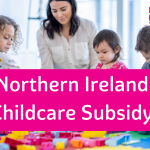A review of the political parties’ manifesto commitments on childcare ahead of the May 2023 Northern Ireland Local Government elections
Ahead of the May 2023 Northern Ireland Local Government elections, Employers For Childcare has reviewed each of the party manifestos to identify what commitments are being made specifically in relation to childcare.
This is a critical issue for families, childcare providers, employers and society as a whole. Childcare is a vital part of our economic infrastructure, and a new Childcare Strategy – underpinned by significant investment – is long overdue in Northern Ireland. Getting this right will be key to giving our children the best start in life, supporting parents to get into and stay in work, education and training, and contributing to the economy, at the same time as ensuring childcare providers are sustainable.
Unlike ahead of the Stormont elections last year, childcare does not feature as prominently within all party Local Government manifestos. While we appreciate that childcare is a major issue, requiring significant investment, which must be addressed at a regional level through the immediate restoration of the Northern Ireland Executive, there are also actions that can be taken at a Local Council level to support childcare providers, the families who rely on them and local employers. These range from business support for local childcare providers and promoting jobs in the childcare sector, to improving access to Council run holiday schemes and putting weight behind the campaign for a new Early Learning and Childcare Strategy.
Read on for a short summary of parties’ commitments, set out in their Local Government manifestos, in relation to childcare:
Alliance
The Alliance Party references childcare within its manifesto under the theme of ‘Community Wellbeing’ and calls for community childcare provision to be supported and council summer schemes expanded.
You can read more here.
Democratic Unionist Party (DUP)
The DUP has previously published its five point plan for Northern Ireland, which includes committing to help working families through the delivery of free childcare, however there is no specific reference to childcare within the Local Government Manifesto.
You can read the Manifesto here.
Green Party NI
The Green Party has previously pledged to introduce a full childcare strategy, however there is no specific reference to childcare within the Local Government Manifesto.
You can read more here.
People Before Profit (PBP)
PBP has previously pledged to the delivery of free hours of high-quality childcare, however there is no specific reference to childcare within the Local Government Manifesto.
You can read more here.
Sinn Féin
Sinn Féin’s Manifesto references support provided by Minister Deirdre Hargey for Councils to provide opportunities for people to gain skills in sectors with skills shortages and employment opportunities such as childcare.
Under the theme of ‘Education’, the party uses its manifesto to commit to improving access to education for those with childcare responsibilities, and under the theme of ‘Planning for Unity’, the manifesto pledges to the delivery of universal childcare.
You can read more here.
Social Democratic and Labour Party (SDLP)
The SDLP’s Manifesto commits to bringing forward new proposals to fund childcare for working parents so that everyone can raise a family and pursue a career if that is what they want.
Under the theme of supporting local business, the SDLP prioritises a campaign for a Childcare Rescue Plan – to freeze and lower costs for parents and to save places – and hold the Executive accountable for a resourced Childcare Strategy that guarantees universally affordable and accessible childcare and early education. There is recognition that childcare costs can place a significant financial burden on parents, and pose a barrier to women’s participation in the workplace.
The Local Government Manifesto references the SDLP’s calls for a resourced Childcare Strategy to be agreed without delay, that guarantees universally affordable and accessible childcare for parents and gives every child the best start in life.
You can read more here.
Traditional Unionist Voice (TUV)
The TUV’s manifesto references the 30 hours free childcare scheme in England, noting that, under the Barnett Consequentials, equivalent money will have been allocated to Northern Ireland – but has not been spent on childcare.
You can read more here.
Ulster Unionist Party (UUP)
The UUP’s Manifesto commits to continuing to campaign on issues that affect low paid working families such as affordable, accessible childcare.
You can read more here.
Use your voice – urge candidates to prioritise childcare
It is clear from the summary above that childcare is more prominent in some party manifestos and plans than in others. We appreciate that childcare featured much more strongly in election manifestos in the run up to last year’s Stormont elections – you can read our detailed summary of the commitments here – but there is still a lot that Local Councils, and those elected to serve on them, can do to support local childcare providers, families and employers. Not least by promoting the issue within their own parties to ensure it remains high on the political agenda when the Northern Ireland Assembly is restored.
Childcare needs to be recognised as a key public good, and as critical economic and societal infrastructure, at all levels of Government.
Ahead of the Council Elections, we are encouraging all voters to use your voice to raise the issues that matter to you – particularly the importance of investing in the high quality, affordable childcare that families need, and in supporting our struggling childcare sector. Ensure when your candidate comes looking for your vote to ask him/her what they will be doing, if elected, to support families, the childcare sector and local businesses.
Find out more about Employers For Childcare’s policy asks
Employers For Childcare’s policy manifesto sets out key issues that must be addressed for the benefit of children and parents, for the local labour market and economy, and for society as a whole. You can read our Policy Manifesto in full here.






